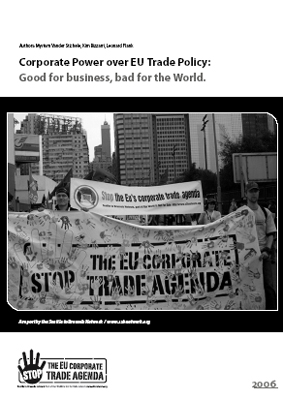
Why should Europe care about lobby transparency?
The Alliance for Lobbying Transparency and Ethics Regulation at the EU (ALTER-EU) and the Seattle to Brussels Network demand in their report mandatory lobbying disclosure and an end to privileged access to EU politics.
The Alliance for Lobbying Transparency and Ethics Regulation at the EU (ALTER-EU) and the Seattle to Brussels Network today demanded mandatory lobbying disclosure and an end to privileged access, as a new report reveals the disastrous impacts of the enormous influence of corporate lobbying on EU trade policy. The demands were made at a press conference the day before European industry interests get together with EU Commissioners for their annual back pat, this year under the slogan "Why do companies care about Europe?"
Barbara Specht, from WIDE (Women in Development Europe), a member of both ALTER-EU and the Seattle to Brussels Network said, "This annual meeting between corporate lobbyists and EU Commissioners is just one publicised example of corporate power over the EU, but is only the tip of the iceberg. For the rest of the year, meetings between the EU and corporate lobbyists take place beneath the surface. There is no transparency for the public, even though it is their interests at stake when business has too much influence."
A new report: Corporate Power over EU Trade Policy: Good for Business, Bad for the World launched today by the Seattle to Brussels Network analyses how corporate lobbyists are able to gain excessive influence over EU trade policy making and the negative effects of this influence on social justice, the environment and the fight against poverty. The report gives concrete examples focusing on different sectors of the trade negotiations including case studies of individual corporations’ influence.
Myriam Vander Stichele, one of the report’s authors, from SOMO (Centre for Research on Multinational Corporations), part of the Seattle to Brussels Network, said "The EU’s position in world trade negotiations shows how dangerous the domination of big business interests in policy making can be. Corporate interests pushed the EU into aggressive demands on market access in developing countries, even though this would lead to increased poverty and environmental destruction in those countries. Commissioner Mandelson has a responsibility to prevent corporate lobbyists controlling trade policy and must use a new approach that looks beyond cost reduction for business."
A crucial step in tackling excessive corporate influence in EU policy making is to increase transparency in EU lobbying. However, in its recent proposals on the European Transparency Initiative, the Commission does not adequately address this – lobbying disclosure would be left voluntary and optional.
Jorgo Riss, member of the ALTER-EU steering committee and Director of Greenpeace EU Unit, said, "We will intensify our campaign to ensure that the European Transparency Initiative delivers meaningful transparency around lobbying. To even begin to address the problem, detailed information must be available about who is paying how much to whom to work on which areas of policy. These answers must be available to the public about all lobbyists."
ALTER-EU members from across Europe gathered in Brussels on October 16-17th to plan the next steps in their campaign for mandatory transparency for all EU lobbyists. The Commission is currently drafting its final proposals for the European Transparency Initiative, which it expects to present at the turn of the year.
Members of both networks will stage a protest outside the UNICE day tomorrow.
Related news
-
 CSDDD Datahub reveals law covers fewer than 3,400 EU-based corporate groupsPosted in category:News
CSDDD Datahub reveals law covers fewer than 3,400 EU-based corporate groupsPosted in category:News David Ollivier de LethPublished on:
David Ollivier de LethPublished on: -
 Additional evidence filed against Booking.com for profiting from illegal settlementsPosted in category:News
Additional evidence filed against Booking.com for profiting from illegal settlementsPosted in category:News Lydia de LeeuwPublished on:
Lydia de LeeuwPublished on: -
 The hidden human costs linked to global supply chains in ChinaPosted in category:News
The hidden human costs linked to global supply chains in ChinaPosted in category:News Joshua RosenzweigPublished on:
Joshua RosenzweigPublished on:

